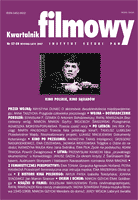Bezcielesny wróg
A Bodiless Enemy
Author(s): Rafał MarszałekSubject(s): Theatre, Dance, Performing Arts
Published by: Instytut Sztuki Polskiej Akademii Nauk
Keywords: Warsaw Uprising; Polish Fil School; Waja Andrzej; Munk Andrzej; Kutz Kazimierz
Summary/Abstract: The following is the text of Rafał Marszałek’s address during the international conference on 'The Warsaw Uprising in the Context of Polish-German Relations' (Warsaw, March 30-April 1, 2007). Marszałek argues that there is no room for an 'absolute enemy' in the selected works by Andrzej Wajda, Kazimierz Kutz and Andrzej Munk of the so-called 'Polish Film School' and that the films are free of the hatred to the Germans as invaders and occupiers. What emerge from the films are a toothless enemy and then a bodiless enemy. The thesis is exemplified in 'Canal' ¬– the death of the Warsaw insurgents is portrayed in a symbolic language; in 'Ostinato lugubre', the second part of 'Eroica', in which the Germans (as enemy) are not the demonic personification of oppression; in 'The Dog' (part of 'Cross of Valor') – the hero saves the life of the dog guarding inmates at an Auschwitz death camp; in 'Lotna', one of few war films in the history of cinema that does without the character of a (German) enemy. Marszałek points out that the 'dematerialization' of the enemy flows from the special (both psychological and moral) instinct of self-preservation rather than forgiveness.
Journal: Kwartalnik Filmowy
- Issue Year: 2007
- Issue No: 57-58
- Page Range: 40-45
- Page Count: 6
- Language: Polish

